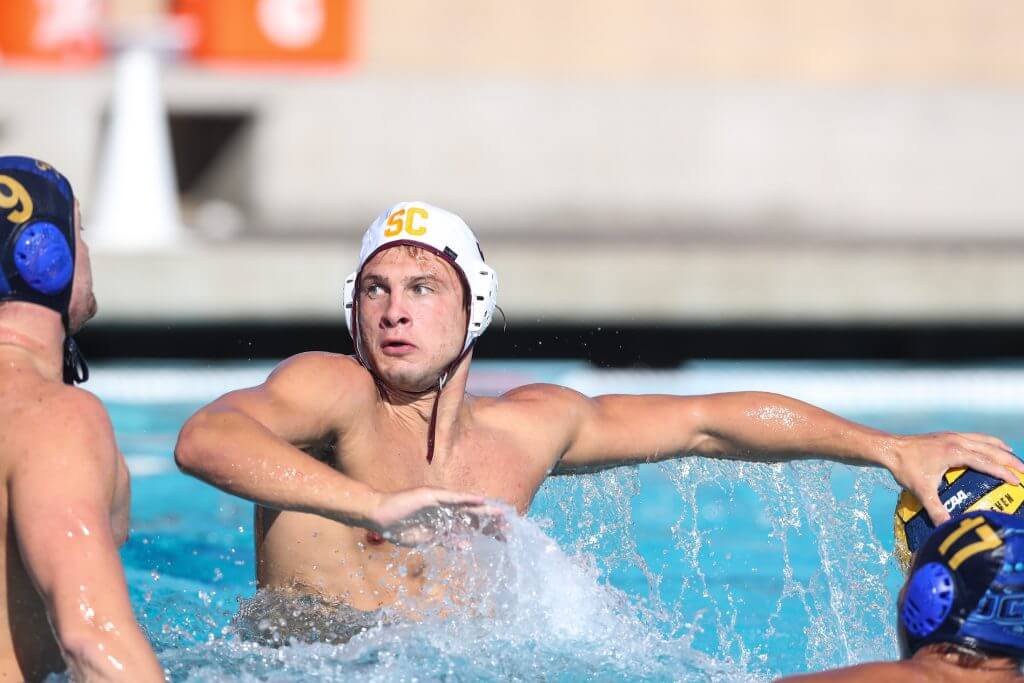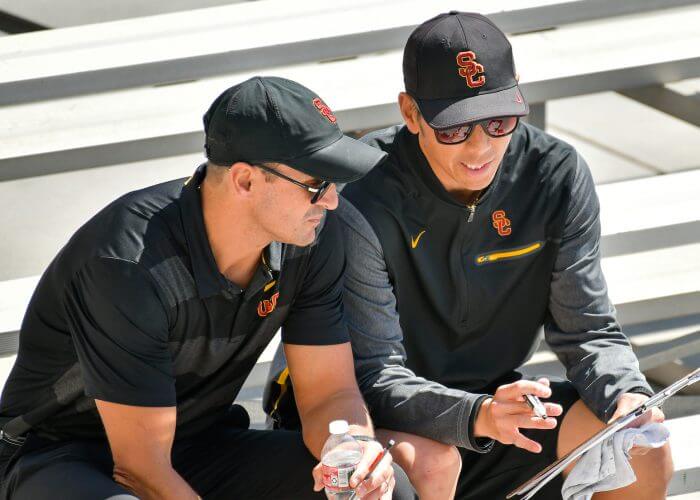Five Questions for Marko Pintaric, USC Men’s and Women’s Water Polo Coach

With the start of a new season for the USC men’s water polo team less than a week away, a new coach has stepped into the void created by the abrupt firing of Jovan Vavic last March. But the first new head coach of Trojan men’s and women’s program in a quarter century is actually not so new. Marko Pintaric came to USC from Croatia as a player in 1997 and never left, leading the Trojans to their first-ever NCAA water polo title in 1998 and staying on as a member of Vavic’s staff for the next two decades.
 With a talented USC program seeking leadership following the dismissal of the all-time winningest coach in NCAA water polo, Pintaric represents a measure of stability in what was the most contentious period in program history.
With a talented USC program seeking leadership following the dismissal of the all-time winningest coach in NCAA water polo, Pintaric represents a measure of stability in what was the most contentious period in program history.
[It’s Official: Pintaric Named USC Men’s And Women’s Water Polo Head Coach]
Like everyone in the USC polo family, Pintaric was overshadowed by the out-sized footprint cast by Vavic, but he has been a key contributor to Trojan success over his 18 years on the coaching staff. For the past three seasons (2016-18), Pintaric served as co-head coach for the USC men, and was on the deck when the Trojans took the 2018 NCAA men’s title, holding off Stanford by the score of 14-12.
[Fast Start, Tense Finish to 2018 Men’s Water Polo Championship Gives USC 10th NCAA Title]
Boasting Hannes Daube (58 goals)—one of the top young players in the world—Jacob Mercep (62 goals), MVP of the 2018 Men’s NCAA Tournament, Marko Vavic (57 goals) a contributor to the U.S. National Team, and Nic Porter (164 saves), who backstopped the Trojans to a national title last December, USC has the talent and experience to repeat in 2019. This puts substantial pressure on Pintaric, not only to replace his long-time mentor, but to produce a title in his first year as head coach.
[2019 Swimming World Men’s Water Polo Previews: Mountain Pacific Sports Federation]
Swimming World reached out to the USC coach last week via email for our annual “Five Question” segment prior to the opening of the NCAA men’s season.
– You represent the best of Trojan Pride: an accomplished athlete who subsequently reached the pinnacle of your sport’s coaching ranks. What is it about USC that inspires loyalty and also breeds success?
It’s definitely the culture here. Since I came to the United State and USC in 1997, the team culture, school spirit and sense of family was definitely what made me decide to stay here and build my life in the USA and around USC. I felt welcome from day one. There’s a sense of being a part of something bigger when you are here at USC.

Marko Pintaric (left) and Casey Moon of USC. Photo Courtesy: John McGillen
– The transition to head coach has likely not been easy for you personally; you are replacing your friend and mentor, Jovan Vavic. Besides winning (!) what will you continue from the Vavic era—and what changes do you have in mind to maintain the Trojan’s unparalleled record of success?
This program’s culture of success is totally attributed to teams. The path we’ve been on and our successes speak for themselves. There’s really not much that we need to change going forward. There’s nothing broken here in terms of water polo and the culture. We’ll continue to execute what we’ve learned, stay focused on hard work‚ and determined to stay on top.
– About that record; USC is again the team to beat this season in NCAA men’s polo. What is it that makes this particular Trojan squad so formidable?
Just the fact that this team stayed together through difficult times, and continued to train together and compete together, shows the determination that these guys have. They constantly drive toward excellence and they work for their teammates. It’s that refuse-to-lose mentality that makes us dangerous.
– You come from a water polo culture (Croatia) that is as dominant as any in the world—and now that culture has been created at USC. What are the similarities between your upbringing in Zagreb and the environment at USC? Are U.S. polo athletes the same as those in Croatia or do you have to adjust to a different mindset for American college students.
I’ve now spent about half my life in Croatia and half in the United States, so I think what I bring to USC is a great merger of a Croatian system and the system in the U.S.
But it’s true that I incorporate a lot of training tactics and techniques that are integrated from what I’ve experienced in Croatia.
– USC has been known for its pipeline of foreign talent as much as strong ties to the fertile SoCal polo talent base. How will you maintain this reservoir of talent, especially now that rivals including UCLA and Cal have made inroads recruiting some of the best international athletes?
We are known for our culture here at USC, so we look to bring in talent from anywhere if they fit into that.
To form a successful team it requires certain types of players, so we don’t look so much at the countries they are from as we do what they can contribute to our game plan. Having a blend of foreign talent and U.S. talent brings a unique cultural experience for us all, and it benefits our team overall to have a well-rounded group.



